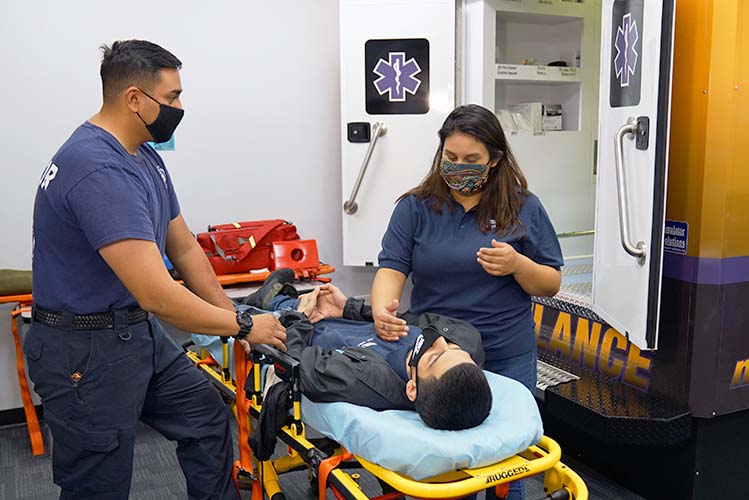REQUEST MORE INFORMATION
Ready to Make a Change? Get Started Today! Book a Campus Tour >
Phlebotomy technicians play a crucial role in the healthcare field. They do so by collecting blood samples from patients for diagnostic purposes. They are trained professionals responsible for drawing blood safely and efficiently, ensuring the integrity of the samples, and providing a comfortable experience for patients.
Do you want to pursue a career as a Phlebotomy Technician in California? In that case, look over this career guide as it will walk you through the steps you need to become a Phlebotomy Technician in the State of California.
Consider enrolling in US Colleges Phlebotomy Technician Program. The program is short-term, allowing you to earn a Phlebotomy Certificate in just a few weeks!
How to Become a Phlebotomy Technician in California?
To become a phlebotomy technician in the State of California, you need to follow the steps outlined below:
Step #1: Meet the Requirements
Ensure that you meet the basic requirements set by the California Department of Public Health (CDPH). These requirements typically include being at least 18 years old, possessing a high school diploma or equivalent, and having good physical and mental health.
Step #2: Complete a CDPH-Approved Training Program
Enroll in a Phlebotomy Training Program that is approved by the CDPH. Choose a program that meets the minimum requirements for phlebotomy training, which typically includes a minimum of 40 hours of didactic (classroom) training, 40 hours of practical training, and 50 successful venipunctures. US Colleges' Phlebotomy Program meets these requirements and will prepare you for a career as a phlebotomy tech.
Step #3: Obtain Hands-On Experience
Some training programs include clinical externships where you can work in a healthcare facility under the supervision of experienced professionals. This hands-on experience will help you develop the necessary skills and confidence in performing phlebotomy procedures.
US Colleges’ Phlebotomy Program will provide you with the hands-on experience that you need to hit the ground running. It does so with an externship where you will be able to practice the skills you’ve learned in a clinical setting.
Step #4: Apply for Certification
After completing your training program, you can apply for certification through one of the approved certification agencies in California. When you submit your certification application, you should make sure to submit all the required documentation and fees along with your application.
Step #5: Take and Pass the Certification Exam
Once your application is approved, you will be eligible to take the certification exam. The exam usually consists of both a written portion and a practical skills demonstration. Prepare for the exam by studying the required materials and practicing the necessary skills.
Step #6: Renew Your Certification
Phlebotomy technician certifications in California are typically valid for two years. To maintain your certification, you will need to fulfill the renewal requirements set by the certification agency, which may include completing continuing education units (CEUs) or demonstrating ongoing competency.
Step #7: Begin Your Career as a Phlebotomy Technician
With your certification in hand, you can start applying for phlebotomy technician positions in hospitals, clinics, laboratories, or blood banks. Your certification and training will make you a competitive candidate in the job market.
Remember to check the specific requirements and procedures set by the California Department of Public Health and the certification agency you choose, as they may have slight variations.
What Are the Different Types of Phlebotomy Technicians?
Within the field of phlebotomy, there are different types of technicians with varying levels of responsibility and specialization. Here are some common types of phlebotomy technicians:
Certified Phlebotomy Technician I (CPT I): CPT I technicians perform basic venipuncture procedures, collect blood samples, and transport them to the laboratory for testing. They may also assist with specimen processing and patient data entry.
Certified Phlebotomy Technician II (CPT II): CPT II technicians have advanced training and can perform additional procedures such as arterial punctures, intravenous (IV) line insertions, and point-of-care testing. They may work in specialized areas such as intensive care units or emergency rooms.
Donor Phlebotomy Technician: Donor phlebotomy technicians specialize in blood collection from donors for blood banks or donation centers. They follow strict protocols to ensure the safety of both donors and recipients.
What Does a Day in the Life of a Phlebotomy Tech Look Like?
As a phlebotomy technician, your day-to-day responsibilities may vary depending on the healthcare setting you work in. However, here is a glimpse into what a typical day in the life of a phlebotomy tech might involve:
1. Preparing for the Day
You may begin your day by reviewing the schedule and preparing the necessary equipment, such as needles, tubes, and disinfectants.
2. Patient Interaction
Interact with patients, explaining the procedure and answering any questions or concerns they may have. Comforting and reassuring patients is an essential aspect of the job.
3. Blood Collection
Perform venipuncture procedures, ensuring proper technique and adhering to safety protocols. Collect blood samples accurately, label them correctly, and ensure their integrity during transport.
4. Specimen Processing
Process collected specimens by centrifuging, separating serum or plasma, and properly storing them for laboratory testing.
5. Documentation
Accurately record patient information, specimen details, and any other necessary documentation for proper tracking and record-keeping.
6. Safety and Infection Control
Adhere to strict safety and infection control measures to prevent the spread of diseases and maintain a clean and sterile environment.
7. Professional Development
Stay updated on the latest techniques, regulations, and industry advancements through continuous education and training opportunities.
Is It Worth It to Become a Phlebotomy Tech?
Becoming a phlebotomy technician can be a rewarding career choice for several reasons:
Growing Job Opportunities
The demand for phlebotomy technicians is in the coming years due to an aging population and advancements in medical technology. This increased demand translates to more job opportunities for qualified phlebotomy technicians.
Entry-Level Position
Phlebotomy offers a relatively accessible entry point into the healthcare field. With a shorter training period compared to other healthcare professions, becoming a phlebotomy tech allows you to start your career quickly and gain valuable experience.
Career Advancement Opportunities
While phlebotomy can be a fulfilling career on its own, it can also serve as a stepping stone to other healthcare professions. With the right education and experience, you can explore opportunities in areas such as nursing, medical laboratory technology, or healthcare administration.
Personal Satisfaction
Working as a phlebotomy technician allows you to make a meaningful impact on patients' lives by providing essential diagnostic samples for accurate medical diagnoses. The satisfaction of knowing that your work contributes to improved patient care can be highly rewarding.
Is It Hard to Become a Phlebotomy Technician?
Becoming a phlebotomy technician requires dedication, commitment, and the acquisition of specific skills. While the training and certification process may present some challenges, it is generally considered achievable with the right mindset and support. Here are a few factors to consider:
1. Training Program
Choosing a reputable and accredited training program, such as the one offered by US Colleges, ensures that you receive quality education and comprehensive preparation for the field.
2. Practice and Experience
Like any skill, phlebotomy proficiency improves with practice. Utilize hands-on training opportunities and clinical externships to gain practical experience and enhance your confidence.
3. Certification Exam
To become a certified phlebotomy technician in California, you will need to pass a certification exam administered by a recognized agency. Proper preparation, including reviewing study materials and taking practice exams, can increase your chances of success.
4. Supportive Environment
Surrounding yourself with supportive instructors, classmates, and mentors can make the journey to becoming a phlebotomy technician more manageable. Seek guidance when needed and utilize available resources to enhance your learning experience.
Remember, becoming a phlebotomy technician requires continuous learning and professional development. Staying up-to-date with industry advancements and regulations will help you thrive in your career.
Become a Phlebotomy Technician With US Colleges
If you want to begin a new and rewarding career as a phlebotomy technician in California, consider enrolling in the Phlebotomy Technician program offered by US Colleges. The U.S Colleges Phlebotomy Tech Program is accredited and hands-on, capable of providing you with the skills and training that you need to succeed in the phlebotomy field.
Begin a new career in the phlebotomy field by obtaining Phlebotomy Training at U.S Colleges. Contact us, and one of our admissions representatives will provide you with all of the information that you need to enroll in the program.




